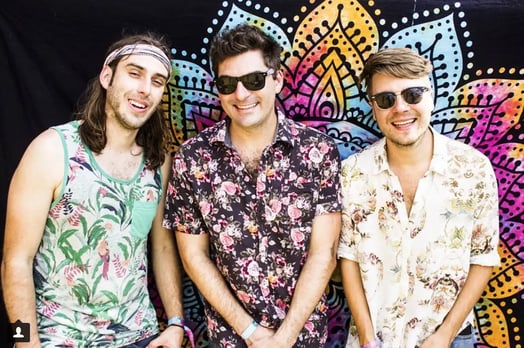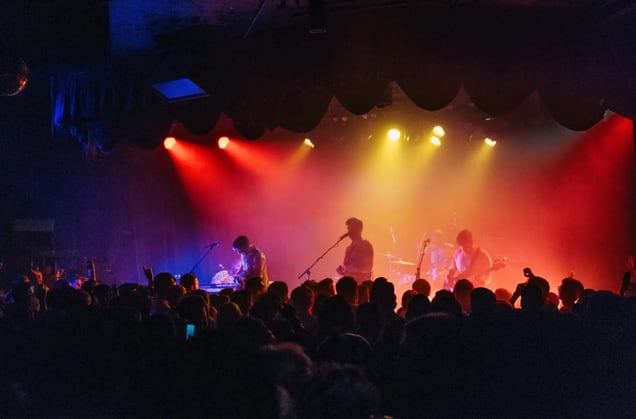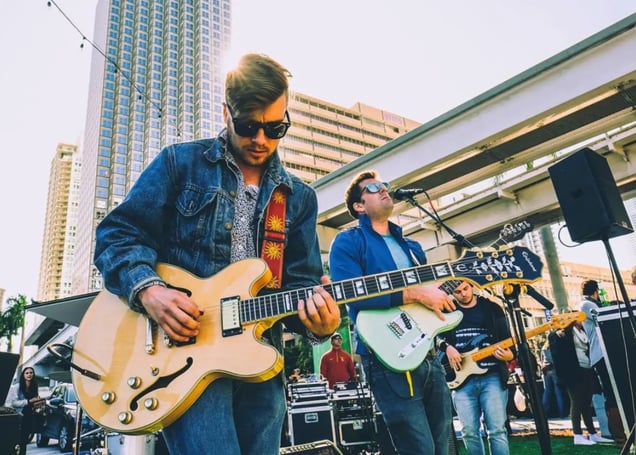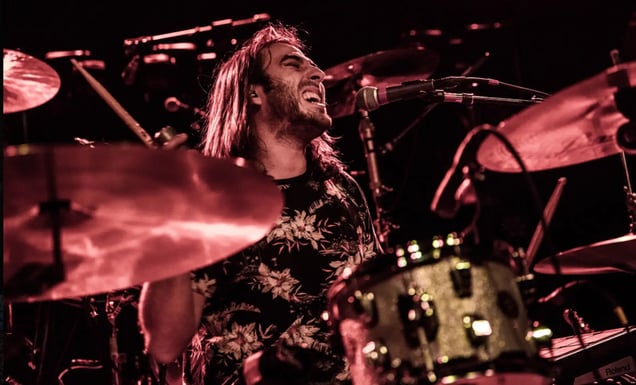If you haven’t heard of Magic City Hippies yet, you will.

Their rise to indie fame has been mythic: From panhandling on the streets of Tampa, to playing on the same bill as Paul McCartney — in the past couple of years they’ve grown to half a million monthly listeners, with top tracks garnering millions of streams from around the world.
On the surface, Robby Hunter, John Coughlin, and Pat Howard exude the laidback island vibes of a millennial Jimmy Buffett with three times the chest hair. But behind the scenes, the self-described “indie funk darlings” of Miami handle everything from designing their website to managing payroll to building their following.
Now, they’re on the precipice of ‘breaking out’. The Hustle spoke to Magic City Hippies on building a brand, self-financing a tour, and how to set it all aside in the studio.

How did you all meet? What were each of you doing at the time?
Robby: I was frustrated that I didn’t have any musical friends at all. I was just frustrated that I wasn’t playing out so I was just like fuck it, I’m gonna go on the street, climb this bank, and pull out my extension cord. I would just be out there for hours and hours and people would tip — maybe $60, $70 a day. Eventually, we went to this place called The Baracuda where I started to play music with these guys. *Points to John and Pat*
John: Sometimes you made more on the street than we got paid at The Baracuda.
Robby: At that time I was in PA school trying to be a physician’s assistant. I got in and I was going to school and I was like, ‘What the hell am I doing? This is not what I want to be doing. So I quit and became a web designer to make a little extra money. That’s what I also do on the side right now.
John: I’m a math teacher. I teach at a school. I teach 4th grade math up to pre-calculus and statistics. So if this doesn’t work out, if anybody needs tutoring …
John: We’re at this place now where we’re about to jump off the edge, take that jump. But for now, I gotta teach class on Tuesdays.
Like you said, you’re on the cusp of going ‘all in.’ When do you think you’ll feel ready to make that leap?
John: We are all in, we just got bills.
Robby: The challenging thing is building your brand. It’s this gradual snowball effect, you have to get out on the road, you have to be physically present, meeting and playing for fans and all that stuff but Spotify has been huge. Our Spotify streams have allowed us to front the cost to go on tour.
John: You see this gradual building, you go on tour and then you see it reflected in these nebulas like Spotify numbers. You’re like, where are these people, who are these people? And then, you connect those things.
How do you know when something is getting traction?
Pat: Definitely streams. Robby checks the numbers.
Robby: It’s enjoyable. Ticket sales are cool to watch slowly go up.
Pat: And the rooms we play. Like last time we were in that city, we played that tiny room, this time we’re playing a mid-level [venue].
John: Me and Robby used to live in Argentina. I have a friend who was listening to the radio at a family gathering [in Argentina] and one of our songs came on. We’re not on the radio here but for some reason, that song was playing in Buenos Aires.
Pat: Really at this point, all of that goes right back into the band, the machine. We work on other things to support ourselves so that the band can self-finance. And then the challenge is just getting it to net enough money to where we can all only do this because touring costs so much money.

Can you break down touring expenses for me?
Pat: We’re kind of in the middle of a trial period with this a little bit. There are companies like Bandago and stuff like that gear their rental service toward bands, but they’re national corporate entities so stuff’s very much like Enterprise or whatever. You’re not going to get a deal because you know someone. Right, you can’t just be like, “Oh, I have this guy. He’s one of my uncle’s friends.” Or whatever.
Pat: If you don’t go balls to the wall touring, it’s totally reasonable. They’re like “Okay here’s how much it costs, but you can only go 1,700 miles.” And most people are like “Well, we’re always going 3,500 miles.”
Robby: Or 5,000.
Pat: And then after that minimum, it’s around 50 cents a mile, then you got the gas and you need the CDW insurance and all this stuff and after three tours you could have bought one of these vans. We bring a tour manager, a merch guy, and two hired guns on the road with us and everyone’s gotta be comfortable leaving their situation to come out and do it. So you make sure everyone’s happy, you’re paying a reasonable living wage, we have a payroll, it becomes this whole operation.
John: My mom’s our accountant.
Pat: Robby also does our website. Having all that shit in-house is pretty valuable.
John: We stayed up to like four in the morning last night at the house.
Pat: We were fixing the website.
How do you like being on the road? As a band, do you feel more comfortable on stage or in the studio?
Pat: It’s great.
John: I love being on the road because five nights in a week, the next day you get to go at it again, and anything on your mind from the night before that you wanted to fix, just nail it. You wake up every day and the only thing you’re thinking is, I got an hour and 15 minutes to play tonight. that feeling of, everything is meant for this set tonight, is very focusing.
Robby: For me, it’s the studio. We play, we pass around who plays the different instruments on the different songs. It’s very Machiavellian. No feasibility concerns or practical concerns at all. But then, when we put it out, we start to think about, Okay, how do we deliver this live? Are there certain things about it we shouldn’t even try to recreate live? And we end up building a sweaty rock show version for some of those songs.

How do you balance finances with making music — do you find it creeps into your creative process?
Robby: When you’re in the studio, you don’t think about touring as much. We make music backwards, we don’t learn the songs until after we put the record out. It’s weird, but it’s what we do. It’s awesome.
Pat: The studio is still pretty sacred compared to all the financial stuff. We also have a spot we rent, just a room in an old Pentecostal, Southern church. It has like 50 people that are a part of the congregation. All these different bands have rooms there.
Speaking of rooms — what’s the best sounding room you’ve ever played?
ALL: Probably the High Five in Indianapolis.
What’s the best thing about playing a festival like ACL?
John: It’s nice at a festival cause you get to meet bigger acts and they could actually remember your band name. Whenever I meet someone I just really want to say our band name really slowly. Like, Magic. City. Hippies. Hi.
Pat: My favorite thing is the cafeteria at festivals.
John: If you go to the artists catering, it’s everybody is just in there and they get their comps, meals, part of the thing. And I just remember Francis and the Lights asking me if there was frozen yogurt.
John: Everyone’s walking around, it just this weird high school cafeteria situation like oh okay, there’s [the band] Glass Hands, alright… who else is at the table? Where’s my band?
What does success look like for you guys?
John: No day jobs, that’s it.
Robby: Not having side jobs, yeah.
Pat: Right now it is actually intertwined with financial goals. Cause we just want to focus on this and take this as far as we can. And that’s the next step.
John: After that, a Latin Grammy. A world tour.
When will you know you’ve ‘made it’?
Robby: Red Rocks [music venue].
Pat: Playing the big arena in Miami would be pretty cool.
John: I’d love for us to just make one song that is just a timeless banger. Oh yeah, and Brazil. Once you play in Brazil, you made it.
